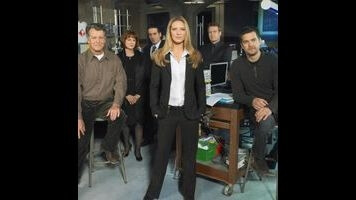Fringe: "Power Hungry"

Judging by the comments on Fringe's previous episode–two long weeks ago–a lot of you felt like the show was taking a step in the right direction by moving deeper into mythology and away from the "each episode stands alone" concept. Me, I'm not so sure. First off, I'm not as down on procedurals as a lot of you are. Not to belabor a point made by my wife last night in her How I Met Your Mother blog–and by me to some extent in this week's Popless column–but I don't buy this notion that TV dramas are inherently better when they're more novelistic, and that TV sitcoms are better when they're shot with a single-camera and laugh-track-free. These are stylistic choices, that come with their own conventions, and each have their strengths and weaknesses. And frankly, the nature of the TV medium–which breaks stories up into digestible chunks, to be consumed relatively passively–doesn't favor the complex. Speaking generally, I'd say that single-camera sitcoms and serialized dramas are superior when done well, but that an average three-camera sitcom and procedural is often more entertaining–and to some extent requires more craftsmanship–than an average single-camera comedy or muddled serial.
Which was my major problem with "The Arrival" two weeks ago. I wasn't bothered that Fringe suddenly shifted gears and started playing up the mystery elements; I was bothered because the results weren't especially satisfying as an hour of TV. Lost is about as mythological and continuity-heavy as any TV show, and yet if I mention "The Constant" or "Walkabout" to Lost-watchers, they won't just be thinking about the new characters or concepts those episodes introduced, they'll be remembering the episodes' emotional and narrative arcs. To me, the genius of Lost is that it's telling such a complicated, far-reaching story in individual chapters that can be beautifully constructed and entertaining in their own right. (Veronica Mars was especially skilled at this as well.) It's clearly possible to combine the episodic and the serial successfully, and I think Fringe has the potential to do just that.
"Power Hungry" wasn't really a knockout episode, but it did give some indication of how Fringe is going to try to finesse this half-procedural/half-serial gambit. Tonight the writers took a two-tiered approach, exploring the meta-story in Olivia's briefings with Broyles, and in her encounters with her ex-partner, John. The dead man keeps haunting her: in her kitchen, in the elevator, and by the Cold Drink machine. (How did Fringe land the lucrative Cold Drink product placement?) At the end of "Power Hungry," Olivia learns that John was conducting his own investigation into Broyles' "pattern" before he got himself killed–and that he was planning to propose to her. All this information serves to string along the home viewer, inviting us to question whether Olivia's playing for the right team in this whole Pattern game.
Meanwhile, the Freak Of The Week storyline starts strong, with arguably the best cold open since the pilot. A lovelorn messenger–and REO Speedwagon fan!–with the power to disrupt electrical devices with his mind, gets rejected by the hipster object of his affection, then ends up beside her in an elevator that promptly plummets to the basement. Cue opening credits. This opener works for a number of reasons, but mainly because we get to spend a little more get-to-know-you time with the freak than usual, and witness the devastating details of his romantic failure. (He thought he'd impress his crush by mentioning that he was in Webelos, then learns that she bought the Brownie badge on her cubicle wall because she thought it was kitschy.)
But despite the added FOTW sympathy, "Power Hungry" promptly peters out, because the level of oddity required for Walter and the Pattern Team to track the Freak down isn't especially high. The big gimmick involves stripping the audio from a REO Speedwagon cassette in order to find the quarry's electronic signature, and then supplying that signature to GPS-implanted carrier pigeons. Neat, but not as visually interesting as some of Fringe's prior experiments in ill communication.
